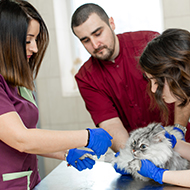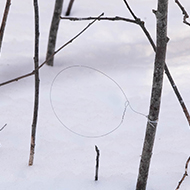A group of dogs have regained use of back limbs A team of scientists from Cambridge University has reversed paralysis in a group of dogs that had previously suffered spinal injuries.
The study involved injecting 34 dogs with olfactory ensheathing cells from the lining of their nose. Twenty-three had cells transplanted directly into the injury site, and the rest were injected with a neutral fluid.
Though none regained full use of their back legs, many of the transplanted dogs showed considerable improvement and were able to walk on a treadmill with the support of a harness.
The nose cells were left for several weeks in the laboratory to grow and expand before being transplanted. Once injected, the cells regenerated nerve fibres across the damaged region of the spinal cord, said the researchers.
The dogs regained the use of their back limbs and were able to coordinate movement, however, the regeneration did not connect the brain to the spinal cord.
A 10-year-old dachshund named Jasper took part in the study.
His owner, May Hay, said: "Before the treatment we used to have to wheel Jasper round on a trolley because his back legs were useless. Now he whizzes around the house and garden and is able to keep up with the other dogs. It's wonderful."
The study, published in the neurology journal Brain, was a collaboration between the Medical Research Council's (MRC) Regenerative Medicine Centre and Cambridge University's Veterinary School, funded by the MRC.






 Birmingham Dogs Home has issued an urgent winter appeal as it faces more challenges over the Christmas period.
Birmingham Dogs Home has issued an urgent winter appeal as it faces more challenges over the Christmas period.
